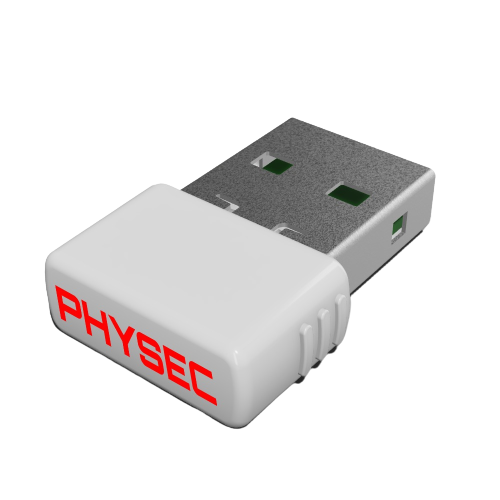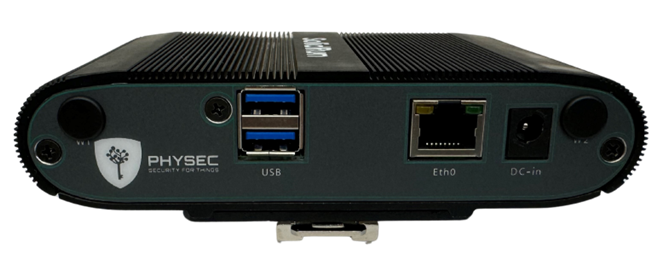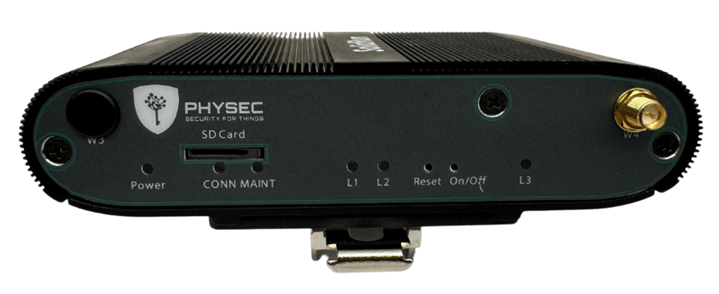As digitalisation progresses, the physical attack surface of systems, devices and infrastructures is increasing significantly. At the same time, regulatory requirements for their protection are growing. PHYSEC SEAL meets this challenge with an award-winning technology for the early and reliable detection of physical manipulation – highly sensitive, scalable and compliant with BSI standards (For more information, see the conformity assessment).
Whether operators of critical infrastructures, system integrators, manufacturers or defence actors: PHYSEC SEAL creates trust in exposed, difficult-to-access or security-critical areas – made in Germany and designed for maximum integrity.
This is how PHYSEC SEAL works
An integrated anti-tamper radio sensor (ATR) creates a high-precision 3D fingerprint of an object. This is checked regularly – even the smallest changes in the micrometre range, such as those caused by drilling attempts or housing deformation, are reliably detected.
Data is transmitted TLS-encrypted to a central platform for secure processing and alerting – including to external SIEM/SOC systems. In combination with our IoT platform IoTree, the data can be visualised and managed in real time and flexibly integrated into existing infrastructures.
The security solution that fits your infrastructure
Critical Infrastructure
Ensure legal compliance
With the "KRITIS-Dachgesetz" and the CER Directive, operators are required to secure physical systems against tampering. SEAL meets these requirements effectively — without structural modifications.
- Tamper detection for electric, gas, and water switchgear
- Securing remote control stations and metering points
- Retrospective alerts in case of physical intrusion
- Audit-proof documentation for regulatory authorities
Your benefit: Proven security with minimal installation effort – NIS-2/CER-ready
System Integrators & Service Providers
Fast integration, secure scaling
SEAL can be integrated seamlessly into existing security infrastructures – ideal for scalable solutions in critical environments.
- Integration with SOC/SIEM systems
- Upgrading existing alerting systems with sensitive sensors
- Retrofit without altering network topology
- Scalable for project-based architectures
Your benefit: Immediate protection for your infrastructure – directly integrable in compliance with BSI standards
Manufacturers & Industry 4.0
Security as a product feature
In smart manufacturing and connected environments, SEAL provides compact, embedded tamper protection — without extra hardware.
- Integration with IoT-enabled controllers and edge gateways
- Protection for embedded devices in industrial plants
- Monitoring of enclosures and control systems
- Enhancing existing product lines with added security
- Compatible with industry-specific regulations
Your benefit: Built-in, future-proof product security – fully compliant
Defence & High Security
Confidence in extreme conditions
SEAL offers high-sensitivity, real-time monitoring for military and remote systems – even without constant network access.
- Protection from targeted sabotage and unauthorized access
- Monitoring of deployable defense systems
- Security for stationary assets
- Tamper detection in remote radar or communication sites
- Integrity monitoring in shielded enclosures
- Retrospective data analysis in case of outages or disconnections
Your benefit: Robust tamper protection wherever conventional systems hit physical or operational limits
Arrange a non-binding consultation now!
Legally compliant physical security with PHYSEC SEAL
With the implementation of the CER Directive (EU 2022/2557) and the new "KRITIS-Dachgesetz", physical security is becoming a legal obligation in Germany and Europe. In future, operators of critical infrastructures will not only have to actively protect their IT, but also the physical integrity of systems and system components - and prove this in an audit-proof manner.
Detection systems are required that recognise physical manipulation at an early stage, prevent malfunctions during operation and document them in a way that can be verified by the authorities. Traditional perimeter protection solutions such as cameras or door contacts reach their limits here: they only detect access, but not the object itself. This means that manipulation often goes unrecognised – especially in areas that are difficult to access or unmonitored.
PHYSEC SEAL goes a decisive step further. The solution thinks safety from the object: the integrated anti-tamper radio sensor detects changes directly on the asset with micrometre precision – without the need for visual sensors or constant monitoring. Even in the event of a power failure or connection interruption, tampering remains traceable as all RF fingerprints are stored and can be analysed retrospectively.
SEAL therefore fulfils not only technical but also regulatory requirements. The solution provides a reliable database for audits, authorities and security certificates, that is compliant with BSI standards – without any structural interventions. This makes physical security documentable, verifiable and effectively realisable – exactly where it is needed.
The revolutionary technology in detail
PHYSEC SEAL combines high-precision sensor technology with intelligent data analysis – for reliable detection of physical manipulation in the smallest of spaces. The solution is based on electromagnetic wave analysis and enables passive, non-invasive monitoring of objects and environments.
Electromagnetic analysis of the environment: SEAL uses electromagnetic waves to create a reference fingerprint (RF fingerprint) of the static environment. This enables passive and non-invasive monitoring without interfering with the infrastructure.
Anomaly detection through RF fingerprinting: SEAL continuously compares current RF snapshots with the stored reference state. Changes in the environment – including tampering - are reliably detected without the need for visual, thermal or motion sensors.
Configurable measurement intervals: The sensor technology can be configured flexibly – from snapshots every second to intervals in the daily range, depending on the respective application.
Lean integration into embedded and ERP systems: SEAL was developed for use in resource-limited systems. The compact design and standard compatibility enable easy integration into existing embedded or security infrastructures.
Ideal for individual objects and compact infrastructure: SEAL is specially designed for monitoring small to medium-sized assets with a volume of just a few cubic metres – ideal for control cabinets, distribution boxes or safety-relevant individual devices.
The technical specifications at a glance
PHYSEC SEAL combines highly sensitive sensor technology with minimal energy consumption and a robust design – optimised for industrial and safety-critical environments.
Recommended operating conditions
| Parameter | Description | Condition | Min | Type | Max | Unit |
|---|---|---|---|---|---|---|
| VUSB | Supply voltage | Normal operation | 4.8 | 5.0 | 5.2 | V |
| IIN | Current with VUSB=5V | Normal operation | – | 4 | 10 | mA |
| TOperation | Operating temperature | Normal operation | -20 | 20 | 65 | °C |
Absolute maximum values
| Parameter | Description | Min | Max | Unit |
|---|---|---|---|---|
| VUSB | Voltage at USB interface | 4.8 | 5.2 | V |
| VDIO_ESD_HBM | Human Body Model maximum discharge voltage | – | 2200 | V |
| VDIO_ESD_CDM | Charged Device Model maximum discharge voltage | – | 500 | V |
Honoured with the NRW 2024 Innovation Award
The innovative technology behind PHYSEC SEAL was honoured with the NRW 2024 Innovation Award in the ‘innovation2market’ category, among others. The jury particularly recognised the development of the anti-tamper radio module. The award ceremony took place on 30 September 2024 in Cologne, with Prof. Dr Christian Zenger accepting the €25,000 prize. Find out more about the award and the technology in the official award winner video.







